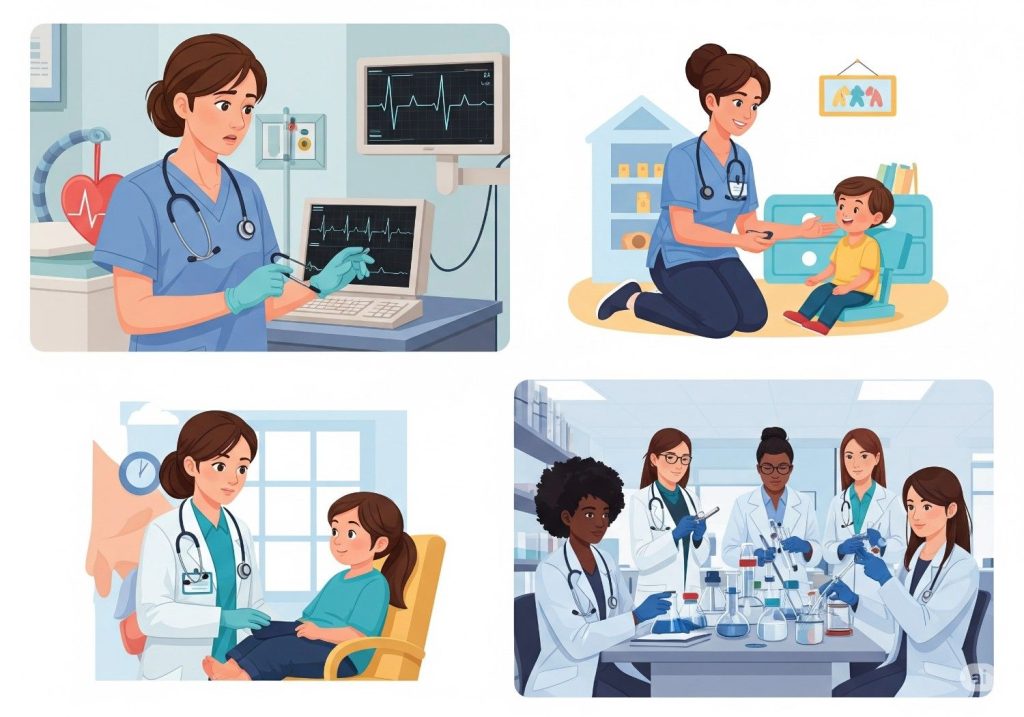Shaping Healthcare Policy
Female doctors are at the forefront of advocating for policies that prioritize patient well-being, health equity, and robust preventive care, ensuring a healthier society.
Mentorship and Advocacy
Many female doctors actively mentor junior colleagues, particularly other aspiring women in medicine, and passionately advocate for gender equality, diversity, and inclusion within the entire medical profession.
Technological Adoption
Leading the integration of new technologies and digital health solutions, women physicians are improving efficiency, expanding access to care, and enhancing diagnostic capabilities across the globe.
Building Inclusive Workplaces
They are instrumental in fostering environments that support diversity, promote crucial work-life balance, and actively encourage the professional growth of all healthcare professionals.
Global Health Initiatives
Female doctors are taking increasingly leading roles in international health organizations and initiatives, directly addressing pervasive global health challenges such as infectious diseases, maternal mortality, and universal access to vaccinations.
The rise of women physicians in leadership positions is unequivocally creating a more balanced, inclusive, and forward-thinking healthcare system, ultimately benefiting patients worldwide and solidifying their contribution to healthcare.
Overcoming Hurdles: Challenges Faced by Female Doctors
Despite their significant progress and invaluable contributions, female doctors continue to face unique and persistent challenges within the medical landscape. These include:

Gender Bias and Discrimination
Both subtle and overt biases can still significantly affect career progression, fair recognition, and even patient interactions, creating an uneven playing field.
Work-Life Balance
The inherently demanding nature of medical careers, coupled with persistent societal expectations regarding family responsibilities, often places a disproportionately heavier burden on women in medicine, frequently leading to professional burnout.
Pay Gap
Despite possessing equal qualifications, performing equivalent work, and achieving comparable outcomes, a persistent gender pay gap remains a significant concern in many parts of the medical profession, reflecting systemic inequalities.
Lack of Representation in Senior Roles
While more women are entering and graduating from medical schools, their representation at the highest levels of leadership and in senior academic positions still lags behind, indicating a need for greater upward mobility.
Maternity and Parenthood Leave
Navigating career breaks for maternity and the subsequent reintegration into demanding medical roles can be particularly challenging, requiring more supportive policies and infrastructure.
Microaggressions and Harassment
Unfortunately, a notable number of female doctors still report experiencing subtle microaggressions or overt harassment in the workplace, undermining their professional environment.
Addressing these pervasive challenges is not only crucial for the well-being and professional growth of female doctors but also for ensuring that the entire healthcare system can fully benefit from their immense talents and unique perspectives. Advocacy, comprehensive policy changes, and the fostering of truly supportive and equitable institutional cultures are vital to creating a fair and inclusive environment for all women physicians.
Diverse Specialties: The Breadth of Female Doctors’ Impact
The increasing number of female doctors has led to their strong and influential presence across a wide spectrum of medical specialties. While traditionally perceived as gravitating predominantly towards primary care, pediatrics, and obstetrics-gynecology, women physicians are now making significant and profound inroads into highly competitive and demanding fields such as:

Surgery
More female doctors are boldly choosing surgical careers, challenging historical norms and consistently excelling in various complex surgical sub-specialties, from general surgery to neurosurgery.
Railway Jobs for Female in India – Best Posts (2025)
Cardiology
Female doctors are increasingly becoming prominent cardiologists, bringing their unique perspectives and expertise to heart health, particularly in understanding and treating cardiovascular conditions in women patients.
Oncology
They play a critical and compassionate role in cancer treatment, leading cutting-edge research, and providing empathetic care to patients and their families throughout their challenging journey.
Emergency Medicine
Facing high-pressure, rapidly evolving situations, women in medicine in emergency rooms demonstrate remarkable composure, decisive action, and exceptional expertise in critical moments.
Neurology and Neurosurgery
These complex and intellectually demanding fields are also seeing a growing number of highly skilled female doctors making substantial contributions to brain health and spinal care.
Anesthesiology and Radiology
These critical support specialties are witnessing a rise in female professionals who ensure patient safety during procedures and provide accurate diagnostics through advanced imaging techniques.
Psychiatry and Mental Health
Often, female doctors in these fields bring a nuanced understanding of emotional well-being, fostering deeper trust and open communication, which are vital for effective mental health care.
This remarkable diversification highlights the immense breadth of talent, dedication, and expertise that female doctors bring to every facet of healthcare, systematically shattering outdated stereotypes and profoundly enriching the medical profession with their varied and invaluable contributions.
The Future of Women in Medicine: Expanding Horizons
The future of women in medicine looks incredibly promising, brimming with potential and continued growth. As more women confidently enter the profession, courageously break long-standing barriers, and ascend to influential leadership roles, their collective influence will undoubtedly continue to expand exponentially. This expansion promises a healthcare system that is inherently:

More Equitable
With greater representation and sustained advocacy, gender disparities in pay, promotion, and professional recognition will steadily diminish, leading to a fairer environment for all.
More Innovative
Diverse perspectives, especially those uniquely brought by female doctors, consistently lead to more creative problem-solving, groundbreaking research, and novel approaches to healthcare challenges.
More Patient-Centric
The inherent emphasis on empathy and a holistic approach to care, often exemplified by female doctors, will continue to profoundly shape healthcare towards a more personalized, compassionate, and effective model.
More Resilient
A diverse and inclusive workforce is undeniably a stronger, more adaptable, and more resilient workforce, better equipped to effectively face future health crises, epidemics, and complex global challenges.
Globally Impactful
As women physicians gain increasing influence and visibility, they will play increasingly significant and pivotal roles in addressing global health inequities, promoting public health worldwide, and advocating for vulnerable populations.
The ongoing advancements in medical technology, coupled with a growing awareness of health disparities and a demand for inclusive care, will undoubtedly provide even more avenues for female doctors to make their indelible mark on society. They are not merely participants in healthcare; they are its visionary architects, actively building a healthier, more compassionate, and truly equitable future for all.
Frequently Asked Questions (FAQs) about Female Doctors
Here are some common questions regarding the role and impact of female doctors in healthcare:
Q1: Are female doctors as skilled as male doctors?
Absolutely. The skill level of female doctors is on par with, and often exceeds, that of their male counterparts. They undergo the same rigorous training, adhere to the same professional standards, and are increasingly excelling in all medical specialties, including complex surgical fields. Research consistently supports their high clinical competence.
Q2: Do female doctors show more empathy in patient care?
While empathy is a quality that varies among individuals regardless of gender, many studies and patient perceptions suggest that female doctors are often perceived as more empathetic and better communicators. This can lead to patients feeling more heard, understood, and involved in their treatment decisions, enhancing overall patient experience.
Q3: What unique contributions do female doctors bring to healthcare?
Female doctors often bring a more patient-centered and holistic approach to care, emphasizing strong communication, shared decision-making, and a deeper understanding of patients’ psychosocial contexts. They also play crucial roles in advocating for health equity, leading in research, and fostering more inclusive medical workplaces.
Q4: What challenges do female doctors commonly face in their careers?
Despite significant progress, female doctors still encounter challenges such as gender bias and discrimination, a persistent gender pay gap, difficulties in achieving work-life balance due to demanding schedules and societal expectations, and underrepresentation in senior leadership roles within medical institutions.
Q5: What medical specialties are female doctors increasingly entering?
While historically concentrated in areas like pediatrics and obstetrics/gynecology, female doctors are now making substantial strides in a wide range of competitive specialties. This includes fields like surgery (general, neurosurgery), cardiology, oncology, emergency medicine, neurology, and various diagnostic and interventional specialties.
Final Thought
The narrative of female doctors in medicine is one of persistent evolution, remarkable resilience, and profound impact. Their unique blend of unwavering clinical skill and deep-seated empathy has not just earned them a rightful place in the medical profession but has actively enriched and humanized it.
41649
As we look to the future, the continued rise and influence of female doctors promise a healthcare landscape that is more compassionate, more equitable, and fundamentally better equipped to serve the diverse needs of humanity. Celebrating their enduring legacy is not merely an acknowledgment of their presence, but a recognition of their indispensable role in shaping a healthier world for generations to come.







